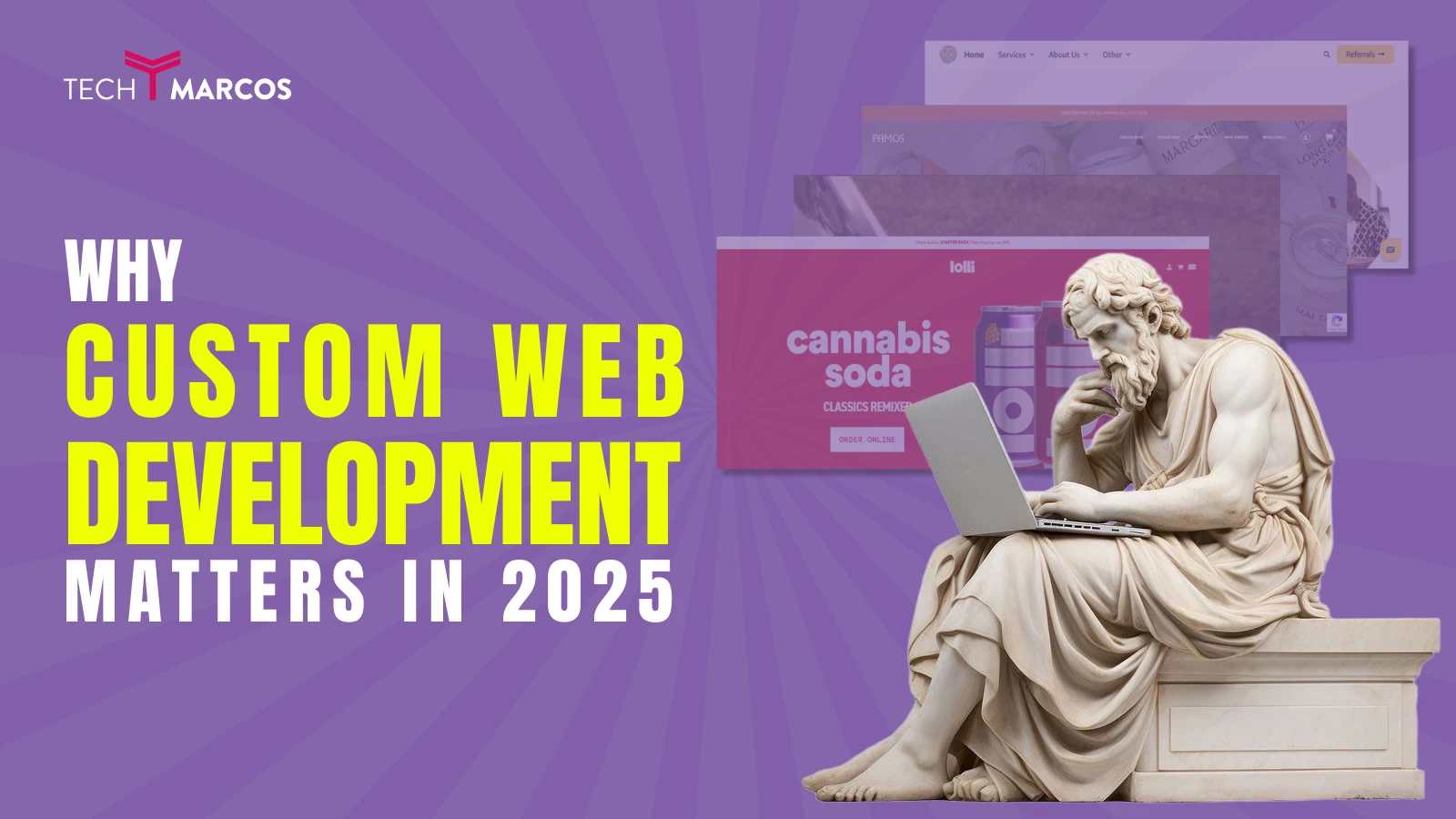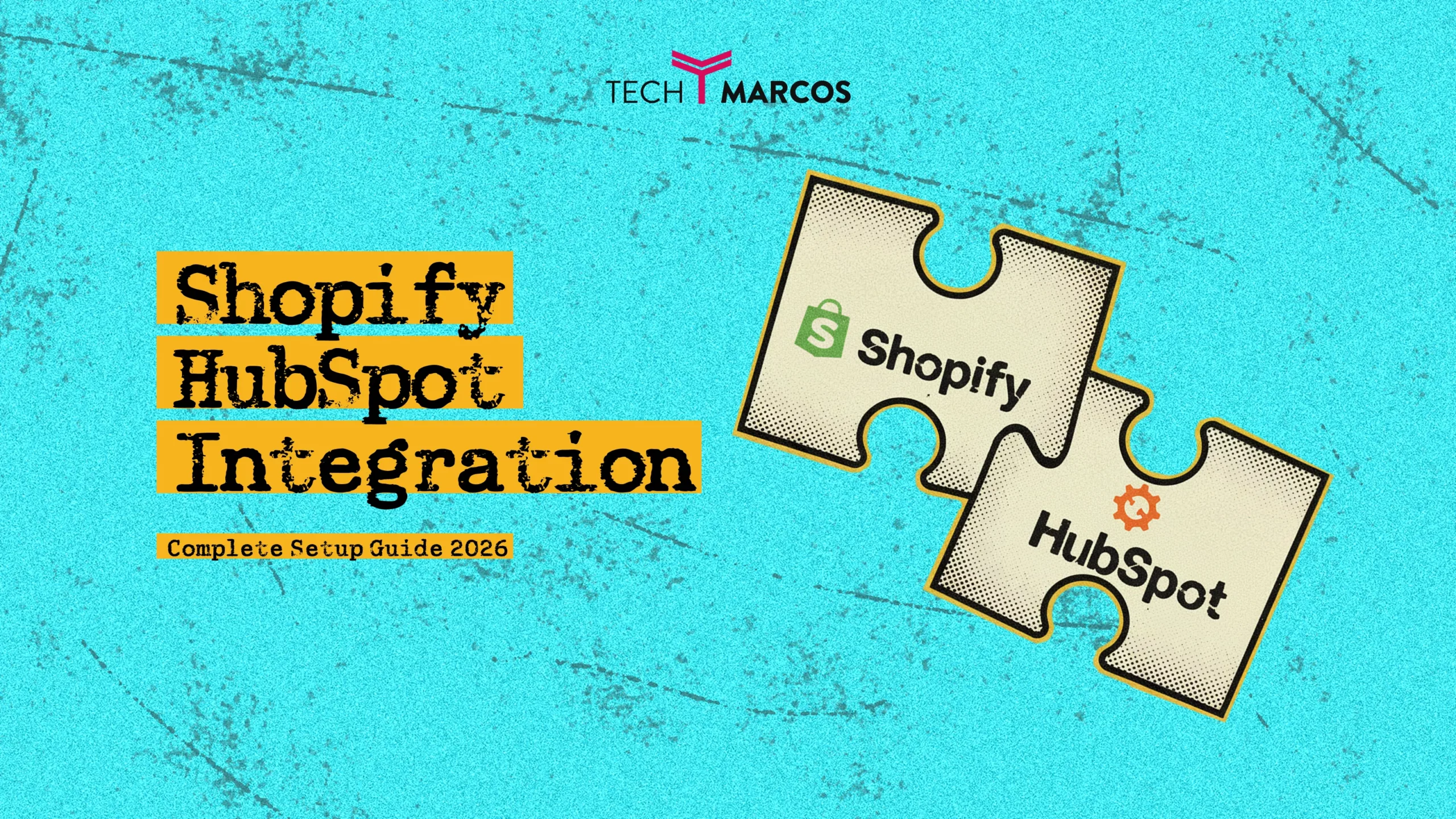What Is Custom Web Development? Benefits, Platforms & When It’s Worth It
|
Getting your Trinity Audio player ready...
|
Introduction: Let’s Start with a Real-World Example
Imagine walking into a store that feels like it was designed just for you. The lighting is just right. The appearance has a logic. Instead i suggest you to make it:
The branding speaks your language — visually and emotionally.You have a good experience and you trust the brand immediately.
Something to consider now, however, is your site.
Is it establishing such a connection with your visitors?
The answer may likely be no, in the case of a generic site template. And that is fine, we all have to begin somewhere.
However, when you have to make a difference, extend your services, and create something that can work effectively in your business, then you need to consider custom web development.
So, what does it actually mean? Let’s break it down in simple terms… why it might be a game-changer to your brand.
What Is Custom Web Development?
Custom web development refers to the development of a web site or web application specifically customized to suit your business features, brand, users and intended objectives. No templates. No shortcuts. No attempts to force your material into someone else’s layout. The difference is that it is similar to building a house by yourself rather than moving to a pre-built apartment. You get:
- Full control over how it looks
- Freedom to add any functionality
- The ability to grow and change it over time
And most importantly: it’s built for your audience — not for the masses.
What Should You Know Before Starting Custom Web Development?
You do not need to know how to code, but what is required is clarity about the vision you want. Before going in here are some questions to consider:
- What’s the purpose of your website? (Lead generation? Selling products? Booking sessions?)
- Who are your users? (And what do they expect from your site?)
- Do you need integrations? (CRM, calendar, chat, etc.)
- What’s your budget and timeline?
- Do you want something that can grow with your business over time?
The more you can articulate your goals, the better your development team can turn them into something tangible.
Types of Custom Web Development Projects
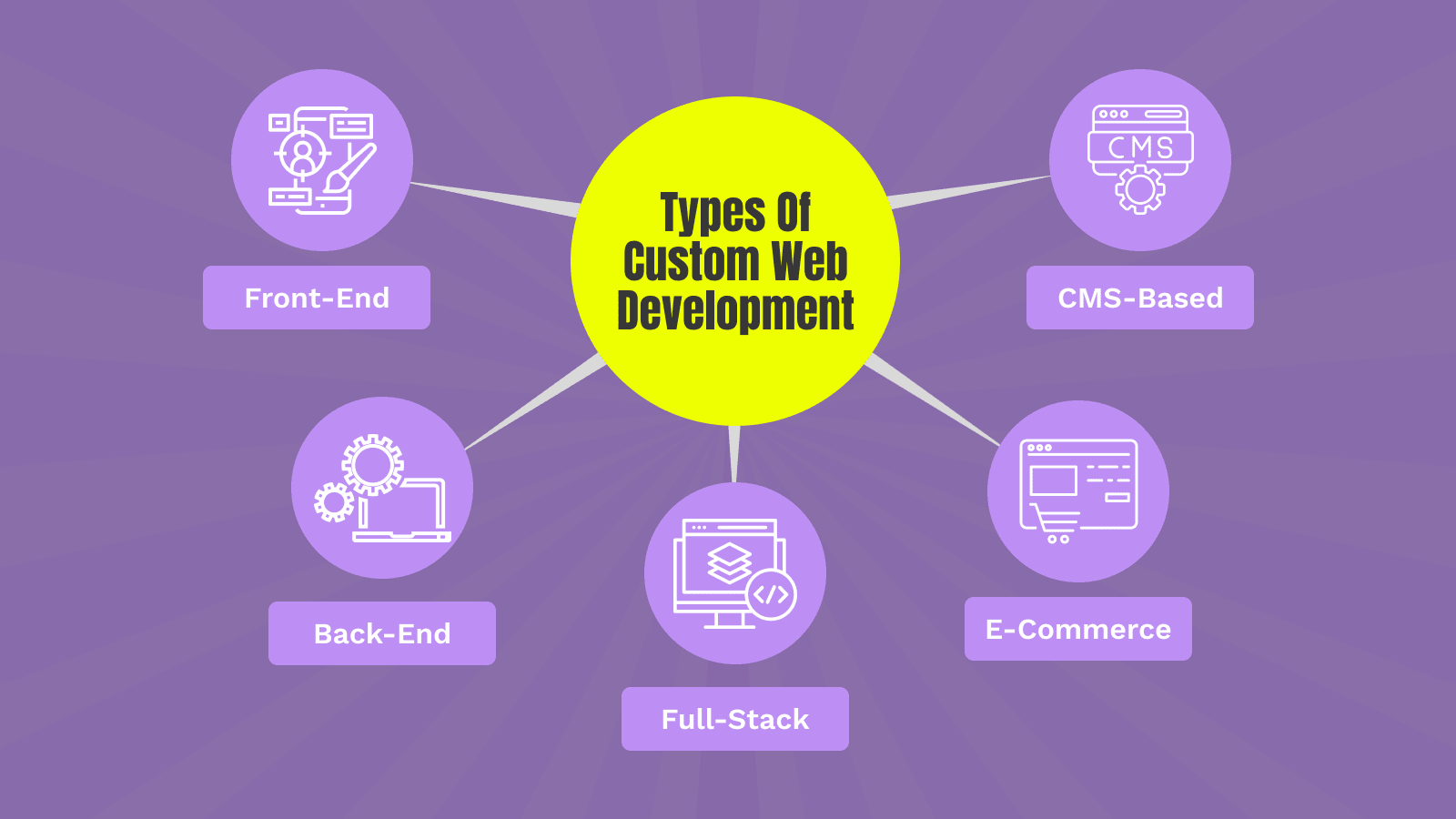
Custom web development isn’t a one-size-fits-all thing. Depending on what you’re trying to build — a basic site, an online store, a software platform — there are a few different “sides” to it. Let’s break them down:
1. Front-End Development
This is the part your visitors actually see and interact with — the layout, buttons, colors, fonts, and how the pages move or behave.
Think of it like the interior design of a house. It’s not about what happens in the pipes or wires — it’s about what the user experiences.
If it’s smooth, responsive, and visually appealing? That’s great front-end work.
2. Back-End Development
This is everything that runs in the background — the stuff that makes your website work.
It handles:
- Logins and user data
- Connecting with databases
- Making sure your contact forms send emails
- Processing payments securely
You don’t see it, but without it, your site would just be a bunch of pretty pages that don’t actually do anything.
3. Full-Stack Development
This is the best of both worlds — front-end and back-end development, combined.
A full-stack developer (or team) builds both what your customers see and what’s happening behind the scenes.
Most modern custom websites are built this way — a complete system designed just for you.
4. E-Commerce Development
If you’re selling products or services online, this one’s for you.
From product pages and shopping carts to checkout experiences and secure payment gateways — e-commerce development handles the business side of your website.
Want to build a custom Shopify or WooCommerce store that doesn’t feel like every other store out there? That’s where custom e-commerce shines.
5. CMS-Based Custom Development
CMS stands for Content Management System — like WordPress or Drupal. This lets you (or your team) manage the content of your site — blog posts, updates, team profiles — without needing to touch code.
With custom CMS development, you’re not locked into the limitations of a pre-built theme. You can get a fully flexible admin dashboard made to match your workflow.
Each type solves a specific problem — and does it your way, not the generic way.
How Helpful Is Custom Web Development?
So let’s be honest — a “custom website” sounds great, but what does it really give you that a pre-built template can’t?
Here’s the thing: a custom-built site is like having a business partner that never sleeps. It quietly handles the heavy lifting behind the scenes, all while giving your brand a confident voice online.
Let’s walk through a few benefits you’ll actually feel:
1. It’s Built Around Your Audience
Every business serves a different kind of customer. So why should your site feel like everyone else’s?
A custom site lets you design every detail — from the words and visuals to the navigation and layout — around how your audience thinks, searches, and shops.
No fluff. No confusion. Just clarity and connection.
2. Better User Experience = More Sales (or Leads)
People are quick to judge websites — if it takes too long to load, if it looks outdated, or if it’s hard to find things… they’re gone.
A well-crafted custom site:
- Loads fast
- Works on all devices
- Has clean, easy-to-follow navigation
- Guides users toward the action you want them to take (like buying, booking, or calling)
This directly affects your bottom line.
3. Total Flexibility as You Grow
Need to add a booking system next quarter? Or launch a members-only section later this year?
With a custom website, you’re not stuck with rigid templates or clunky workarounds. You can build — and scale — features whenever you’re ready.
That’s peace of mind most template sites simply can’t offer.
4. Integrates with Tools You Already Use
Whether it’s:
- Stripe or Razorpay for payments
- HubSpot or Mailchimp for CRM and email
- WhatsApp or Calendly for communication …custom websites can connect with almost anything.
Your site becomes a hub — not just a brochure.
5. More Control = Less Clutter
Templates often come with bloated code, unused features, and random plugins you’ll never need. That slows things down.
Custom development means every feature is there for a reason — which keeps your website faster, lighter, and easier to maintain.
6. It Looks (and Feels) Like You
Your brand has a personality — your website should reflect that.
Colors, tone, layout, animations, micro-interactions… with custom design, you can build a digital experience that feels like an extension of you.
And when that experience matches what your customer is looking for? You win.
Why You Might Actually Need a Custom Web Development Solution
We’ve all seen those sleek templates and drag-and-drop builders that promise a “professional website in minutes.” And for some businesses — especially just starting out — they might work fine.
But let’s be real: As your business grows, those one-size-fits-all solutions start to show their cracks.
Here’s why a specialized custom solution isn’t just “nice to have” — it’s often what separates standout brands from forgettable ones:
1. Templates Make You Blend In — Custom Makes You Stand Out
Templates are fast and cheap. But guess what? They’re also being used by hundreds (or thousands) of other businesses.
Your website shouldn’t look like your competitor’s — it should reflect you.
Your voice. Your story. Your goals. Custom development gives your brand a face that’s instantly recognizable — not easily replaceable.
2. It Strips Away What You Don’t Need
Most templates are bloated with features you’ll never use — things added just to “look impressive.”
Custom websites keep only the features that serve your business. Nothing more. Nothing less. That means:
- Faster loading times
- Less maintenance
- More reliable performance
It’s clean, efficient, and focused on what really matters.
3. It’s Built for Long-Term Growth
Templates are like tiny apartments — they’re fine… until you try to host a big party or move in more furniture.
A custom-built site, on the other hand, is like building your own home — with room to expand. Whether it’s:
- Adding new features
- Scaling for traffic
- Integrating new software
You’re set up to grow — without rebuilding from scratch.
4. It Aligns With Your Business Strategy
A template can’t think about your customer journey. It can’t tailor the experience to your niche. It’s just a canvas.
A custom solution follows your goals — every section is mapped, written, and designed around:
- What your users need
- What your business offers
- How your audience moves through the site
It’s strategy and storytelling, combined.
5. It Builds Trust (Without You Saying a Word)
Visitors judge a website in seconds. A clunky layout or generic feel immediately signals, “This brand might not be professional.” But when your website:
- Feels smooth
- Reflects your brand
- Loads quickly
- Guides people clearly
…you build instant credibility. No pushy sales tactics required.
Custom Website vs. Ready-Made Template: What’s the Difference?
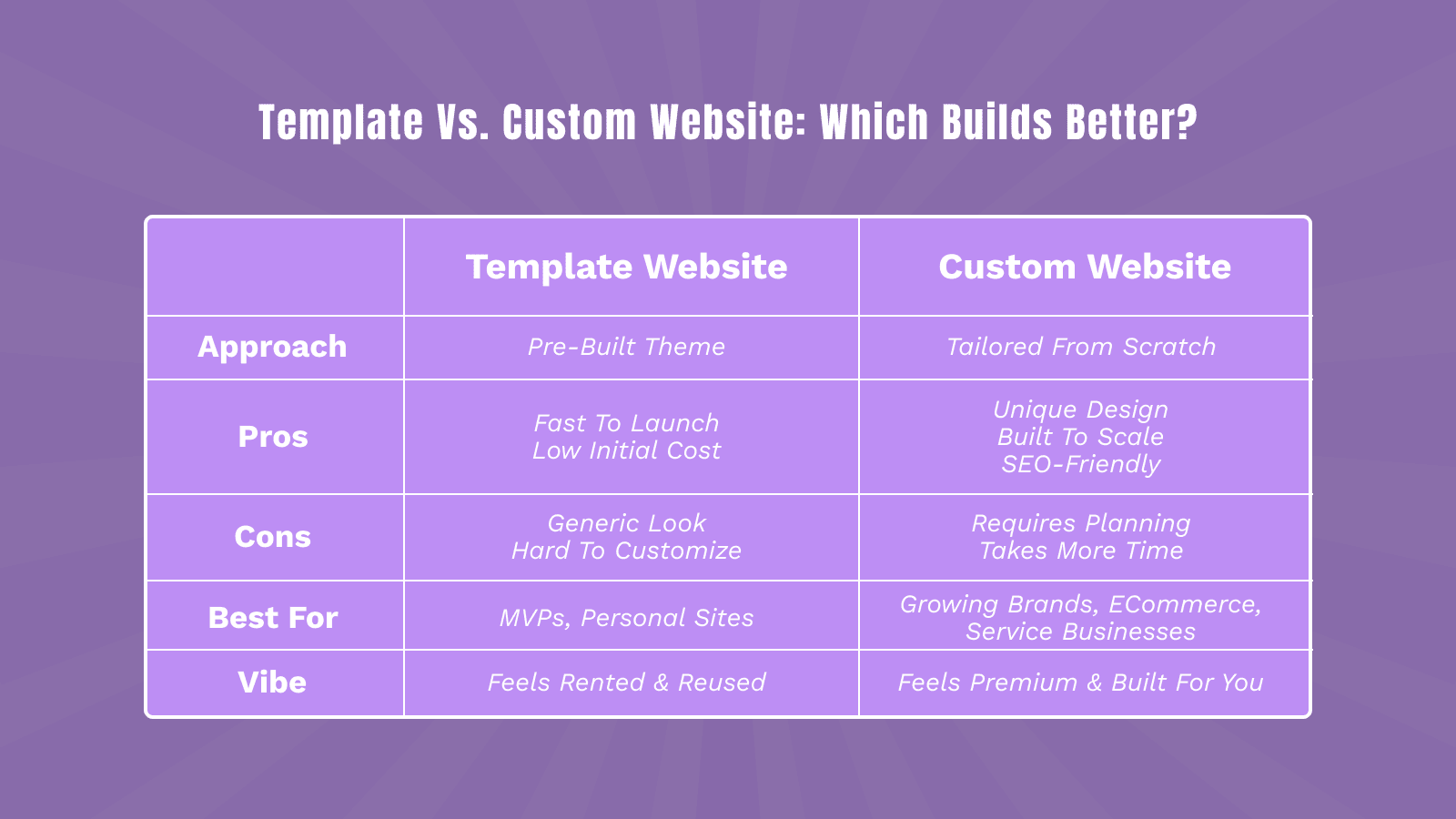
(And Which One Makes Sense for Your Business)
If you’ve ever Googled “how to build a website,” chances are you’ve come across a ton of ready-made templates — from WordPress themes to Wix designs that promise drag-and-drop simplicity.
Sounds convenient, right? But what’s the catch?
Let’s break it down like this:
Templates are like renting a fully furnished apartment.
Custom development is like designing your dream home from the ground up.
Both have their place — but they’re built for very different needs.
Ready-Made Templates: The Good, The Bad & The Realistic
Pros:
- Quick to launch — you can be live in a day or two
- Lower initial cost
- Minimal technical knowledge needed
- Ideal for personal projects, portfolios, or MVPs
Cons:
- Limited flexibility — you’re locked into the template’s layout
- Generic feel — thousands of others might be using the exact same theme
- Hard to scale — adding features often requires workarounds or plugins
- Performance can suffer due to bloated code
- SEO optimization is usually subpar
Good for: Side projects, early-stage startups, solopreneurs testing an idea.
Custom Website Development: Built for You (and Built to Last)
Pros:
- Tailored to your brand, audience, and goals
- Clean code = faster loading and better performance
- Scalable — you can add features as your business grows
- Designed with SEO and UX in mind from the start
- Seamless integrations with CRMs, payment systems, APIs, and more
Cons:
- Takes longer to build
- Higher upfront cost
- Requires collaboration with a development team
Good for: Growing businesses, service providers, eCommerce brands, and anyone looking to stand out in a competitive market.
So… Which One’s Right for You?
Here’s a quick way to think about it:
| If you need… | Go with… |
| Something fast and temporary | ✅ Template |
| A fully branded experience | ✅ Custom |
| A site that’s just informational | ✅ Template |
| Complex features or integrations | ✅ Custom |
| High performance and SEO control | ✅ Custom |
| Freedom to evolve the site over time | ✅ Custom |
Bottom line?
Templates are for “getting online.”
Custom is for “owning your online presence.”
What Platforms Power Custom Web Development?
When we talk about “custom web development,” we’re not always building from scratch using raw code and empty files.
Most websites are powered by platforms or frameworks — like WordPress or Laravel — that offer flexibility, control, and reliability. The key difference? With custom development, you’re not limited by what the platform gives you out of the box. You extend it to match your brand and goals.
Let’s explore the most popular platforms used by professionals — and which ones might suit your business.
1. WordPress
The go-to CMS (Content Management System) for flexibility and ease of use
- Powers 40%+ of all websites globally
- Great for blogs, service sites, portfolios, and even eCommerce
- Can be made completely custom with themes, plugins, and development
- User-friendly backend for non-tech users
Best for: Businesses that want powerful features + easy content control.
2. Shopify
Built specifically for eCommerce — simple, secure, and scalable
- Fully hosted platform focused on selling online
- Easy setup, beautiful themes, and secure payment options
- Custom functionality can be added via Shopify apps or API integrations
Best for: Online stores that want fast setup with a polished look.
3. WooCommerce (on WordPress)
Combines the flexibility of WordPress with full eCommerce features
- Fully customizable product/store experience
- Access to 1000s of plugins and themes
- Ideal for brands that want full control over design and checkout flow
Best for: Online stores that need unique functionality and tight branding.
4. Magento (Adobe Commerce)
An enterprise-grade eCommerce platform
- Built for large-scale stores with custom workflows and advanced features
- Excellent for international selling, complex product catalogs, or integrations
- Requires professional development and maintenance
Best for: Big businesses with big inventories and global ambitions.
5. Laravel
A powerful PHP framework for full custom web apps
- Clean architecture, scalable code, and security baked in
- Used to build anything from portals to dashboards to SaaS platforms
- Great for businesses with complex needs (like internal tools or CRMs)
Best for: Startups, SaaS platforms, or businesses building custom software.
6. Drupal
A highly customizable CMS used by governments, universities, and large orgs
- Super flexible for managing large amounts of content
- Higher learning curve but powerful in the right hands
- Excellent for multilingual or high-security sites
Best for: Content-heavy websites that need performance and flexibility.
7. Headless CMS (e.g., Strapi, Contentful)
Content is managed separately from the front-end
- Great for multi-channel experiences (like apps, websites, and kiosks)
- Offers high speed and future scalability
- Needs custom front-end development (e.g., React, Vue)
Best for: Brands that want lightning-fast, API-driven experiences.
The best platform isn’t about what’s popular — it’s about what fits your business.
A skilled custom development team won’t just code — they’ll recommend the right platform, tailor it to your needs, and make sure it works beautifully for your customers (and your team).
Things to Think About Before You Start Your Custom Website
(A Friendly Guide to Making Smarter Decisions)
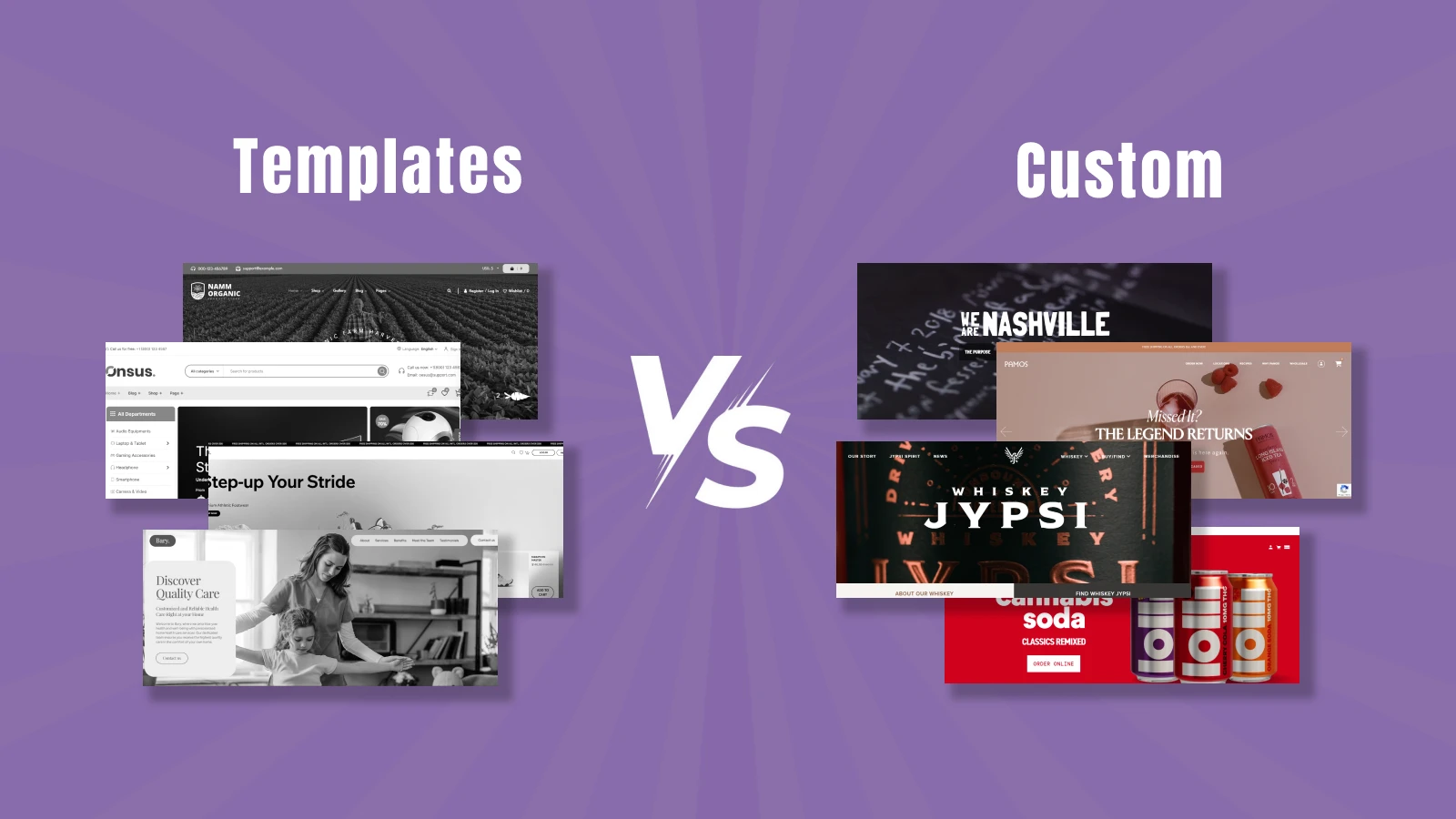
Before you dive into custom web development, take a breath. It’s exciting, sure — but it’s also an investment. In time, money, and energy.
So how do you know you’re headed in the right direction?
Let’s walk through a few key questions every business owner should ask themselves first:
1. What’s the Main Goal of the Website?
Sounds obvious, but this one gets skipped a lot.
- Do you want more sales?
- More sign-ups?
- A portfolio to showcase your work?
- A content hub to attract organic traffic?
Your goals will directly shape the way your site is designed, developed, and even written. A good developer won’t just ask what you want built — they’ll ask why.
2. Who Are You Building It For?
If you’re not thinking about your audience, you’re just building a digital flyer.
- Who are your ideal visitors?
- What do they care about?
- How do they like to interact with websites?
Every color, word, image, and button should be tailored to make them feel seen and supported.
3. What’s Your Budget (Now and Later)?
Here’s the thing about websites — the cost isn’t just about building it. You also have to think about:
- Hosting
- Maintenance
- Ongoing updates
- SEO and performance tweaks
A custom site doesn’t have to cost a fortune — but you should be clear on what you’re comfortable investing upfront and over time.
4. Do You Need to Manage Content Regularly?
If you’re planning to:
- Publish blog posts
- Update product listings
- Change text or images often
…you’ll want a CMS (Content Management System) that’s user-friendly and built around your workflow.
A good custom developer will either recommend the right CMS (like WordPress, Drupal, or a headless setup) — or build you a custom dashboard that makes updating your site feel like second nature.
5. Will People Visit From Their Phones? (Spoiler: Yes)
Mobile is not optional anymore. In fact, it’s often where the majority of your traffic comes from. So your site needs to:
- Load fast on mobile
- Be easy to scroll, tap, and navigate
- Avoid clunky popups or tiny text
Custom websites are designed mobile-first — not just “mobile-okay.”
6. Do You Care About SEO? You Should.
Even the most beautiful website won’t help if no one can find it.
Custom development gives you control over:
- Site speed (a ranking factor)
- Clean code structure
- Optimized headings and schema
- Mobile responsiveness (again — SEO gold)
So yes — a custom site absolutely gives you an SEO advantage.
7. What Does Your Business Really Need Right Now?
This is where honesty matters. Are you just starting out and need a simple but solid site? Or are you scaling and need custom integrations, automation, or localization?
A good web development partner won’t just sell you “more.” They’ll help you match the solution to your current stage — and build in the flexibility to grow when the time’s right.
Final Thoughts: Is Custom Web Development Right for You?
In the event that you are concerned about creating something that speaks of your brand name, operates as you need it, and scales with your business, custom development is totally worth the effort.
It is the investment of your appearance online.
And that investment counts especially in a world where your first impression is usually your web site.
Ready to explore your custom website journey?
We help businesses turn big ideas into smart, scalable websites — minus the tech overwhelm.
Talk to a Custom Web Expert
Explore Our Custom Web Development Services
